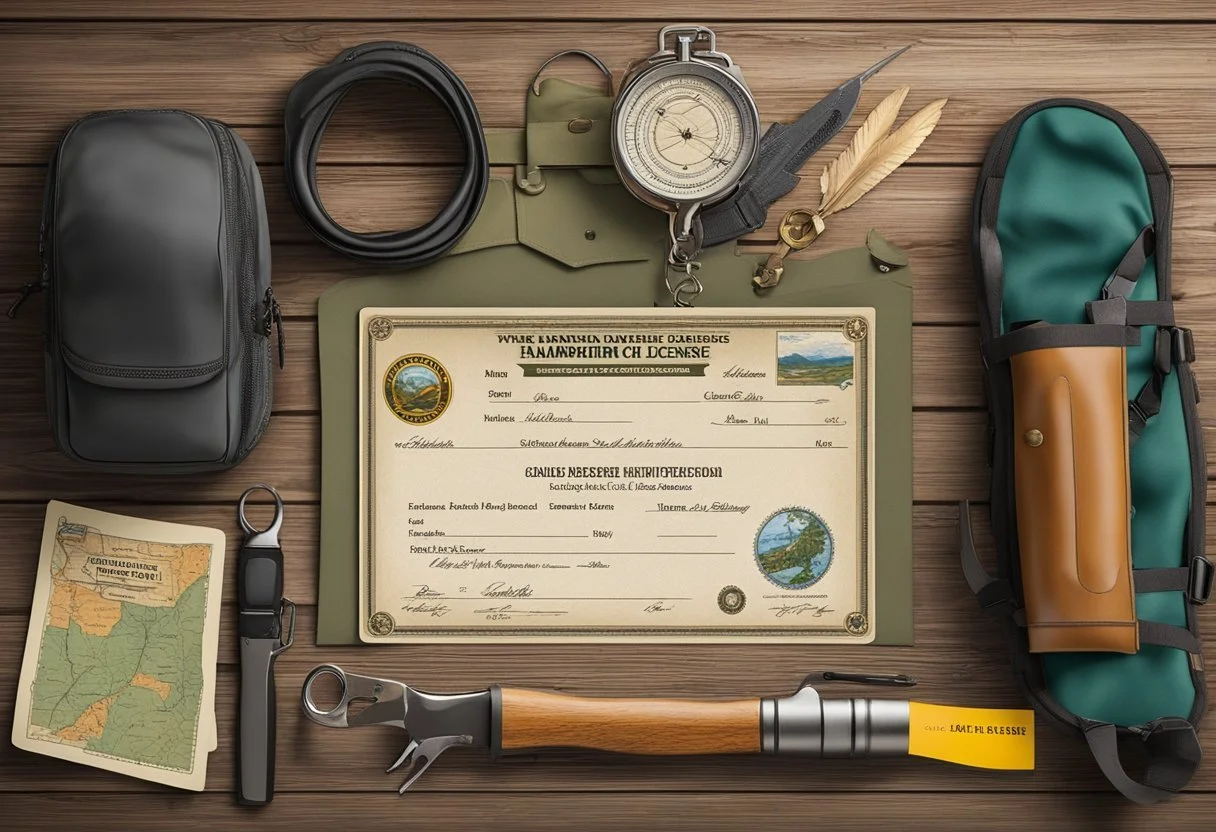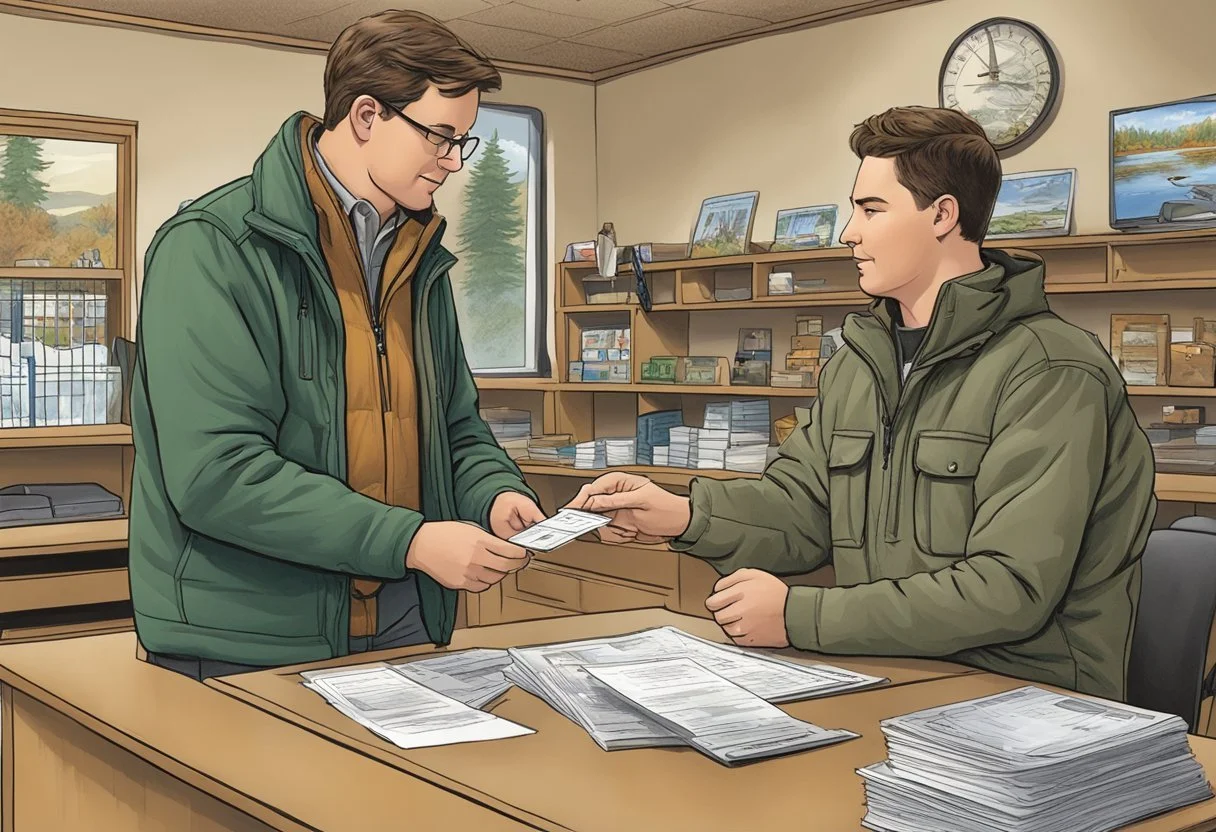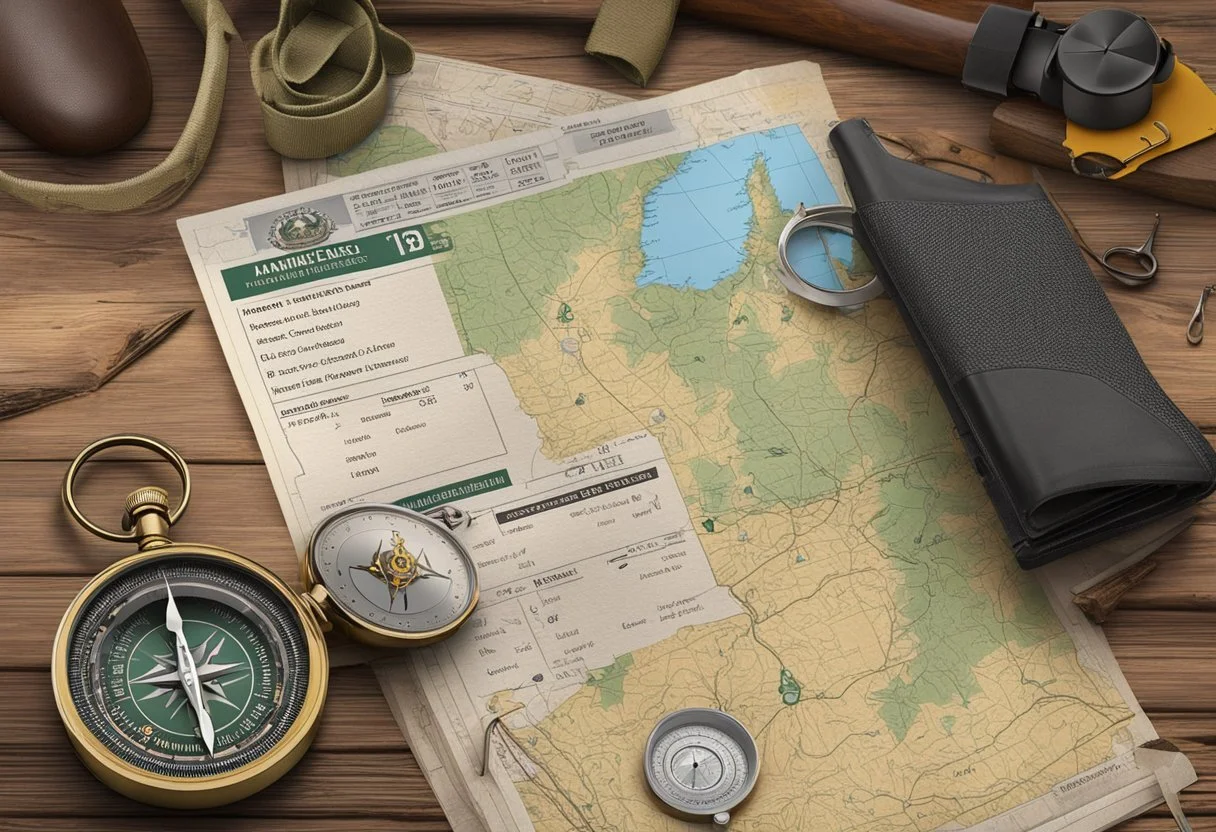How to Get a New Hampshire Non-Resident Hunting License
Your Guide to Out-of-State Regulations
This Article is Part of Our Guide to Non Resident Hunting Licenses by State
Non-resident hunters looking to experience the rich hunting grounds of New Hampshire will need to secure a non-resident hunting license. The New Hampshire Fish and Game Department regulates the issuance of these licenses, aiming to maintain the balance of the state's ecosystems while offering hunters opportunities to enjoy the diverse wildlife. Licenses are available for purchase online, at various authorized licensing agents throughout the state, and directly from the Fish and Game Headquarters located at 11 Hazen Drive, Concord, NH 03301.
The process for non-residents to obtain a hunting license in New Hampshire is straightforward and entails adherence to specific regulations and fees distinct from those applicable to residents. Non-residents are required to carry their signed licenses at all times when hunting. The state's hunting regulations are designed to ensure sustainable wildlife populations and a fair chase, keeping in mind safety and the overall well-being of the natural resources.
Understanding the different types of available licenses is crucial, as New Hampshire offers various options tailored to different species and hunting methods, such as archery. Non-residents should be aware that different seasons and additional restrictions may apply to their hunting activities. For the most current regulations, season dates, and detailed licensing information, individuals should contact the New Hampshire Fish and Game Department or visit their official website.
Eligibility Criteria for Non-Residents
Non-resident hunters intending to hunt in New Hampshire must meet specific age and hunter education requirements. The state enforces these criteria to ensure safety and conservation practices are adhered to by individuals partaking in hunting activities.
Age Requirements
All non-resident hunters must observe the age-related regulations set forth by New Hampshire. Key points include:
Under 16 years of age: They must be accompanied by a licensed adult 18 years or older while hunting.
16 years and older: They may hunt independently but are still required to comply with New Hampshire non-resident licensing regulations.
Hunter Education Certification
Non-resident individuals must have completed a hunter education course to be eligible for a New Hampshire hunting license. The certification specifics are as follows:
Certification required: A valid hunter education certificate from their home state or province is accepted.
Course completion: The course must be approved by the hunter education system in their state or Canadian province.
Types of Non-Resident Hunting Licenses
The State of New Hampshire provides a variety of hunting license options for non-residents, each catering to different hunting preferences and species. These licenses are mandatory for engaging in hunting activities within the state.
Regular Hunting License
Non-residents in New Hampshire can purchase a Regular Hunting License, which allows them to hunt a variety of wildlife species during the appropriate seasons. In the search results provided, the price for this license was listed at $151.00.
Special Archery Deer Permit
For those specifically interested in deer hunting with a bow, there is the Special Archery Deer Permit. This permit is an add-on to the regular hunting license and it focuses on the bow hunting season for deer.
Muzzleloader License
Hunters who prefer the traditional art of muzzleloading can obtain a Muzzleloader License. This license is required for hunters wishing to participate in the special muzzleloader seasons designated for deer and other game.
Turkey License
Non-residents looking to hunt turkey (What wine goes well with turkey?) in New Hampshire need a separate Turkey License in addition to their regular hunting license. This ensures compliance with regulations during turkey hunting seasons.
Application Process
Obtaining a New Hampshire non-resident hunting license involves a straightforward process that can be completed through various methods, including online, in person, and by mail. Applicants should ensure all information provided is accurate and that they follow the specific steps required for each application method.
Online Application via huntnh.com
Non-residents may apply for a New Hampshire hunting license online at huntnh.com. This is the quickest method, offering immediate processing:
Navigate to the official website.
Complete the required fields with personal and payment information.
Submit the application form.
Upon approval, download or print the license directly.
Applicants need to provide a valid email address for communication and a credit card for payment.
Application Through License Agents
License agents across the state are authorized to process hunting license applications:
Find a local agent: Agents are typically found in sporting goods stores or other designated locations.
Provide necessary documents: Present identification and other required details in person.
Agents can offer additional help and answer questions during the application process.
The NH Fish and Game Department provides a list of agents on their website.
Mail-in and Walk-in Applications
For those preferring a traditional method or who may not have internet access, mail-in and walk-in options are available:
Mail-in: Send completed application forms to the NH Fish and Game Department's headquarters, located at 11 Hazen Drive, Concord, NH 03301.
Include all required documentation.
Include payment as instructed on the form.
Walk-in:
Visit the headquarters at the same address.
Office hours are 8:00 AM - 4:00 PM Monday through Friday.
Phone: For additional information, applicants can call (603) 271-3422.
Applications are reviewed and processed, with licenses sent to approved applicants through their specified delivery method.
Fees and Costs
When purchasing a non-resident hunting license in New Hampshire, individuals can expect to adhere to a structured fee system. The state mandates a range of costs depending on the specific type of license required.
For those interested in small-game hunting, the cost for a non-resident is $53.00 for a general license. A three-day option is also available at a fee of $25.00. However, it's important to note that neither of these fees include the mandatory $2.50 Wildlife Habitat Fee.
License Type Fee (Non-resident) Small-game Hunting $53.00 Small-game Hunting 3-day $25.00
An additional charge to be aware of is the transaction fee applied to each license purchase. When buying a license, a non-resident will incur a $2.00 transaction fee per license, or $2.75 if the transaction is completed online.
When planning to hunt in New Hampshire, non-residents should also consider that certain special licenses may be required for specific game or hunting areas, which come with their own associated costs.
It is crucial for hunters to carry their signed licenses while engaging in hunting activities. Licenses can be conveniently purchased online, from local agents, or directly through the New Hampshire Fish and Game Department. Non-residents are advised to allot their budget accordingly to ensure all necessary licenses and fees are covered for a legal and enjoyable hunting experience in New Hampshire.
Regulations and Seasons
In New Hampshire, specific hunting seasons and regulations are enforced to ensure sustainable wildlife populations and safe hunting practices. These vary for different game species and types of hunting equipment.
Deer Hunting Regulations
Deer hunting in New Hampshire is regulated by distinct seasons, each with its own set of rules. For non-residents, hunting licenses are mandatory, and regulations stipulate that one must have landowner permission to place game cameras on private property. The state specifies the duration that such permissions are valid, typically expiring on December 31 of each year unless extended or revoked.
Municipal and state lands have their own set of guidelines, which hunters must adhere to. It is crucial for all hunters to familiarize themselves with these regulations before engaging in deer hunting activities to ensure compliance with state law.
Bear and Waterfowl Seasons
For bear hunting, non-residents are required to adhere to specific seasons designated by the New Hampshire Fish and Game Department. These seasons are established to manage bear populations effectively and to align with the bears' annual life cycles, which can affect their vulnerability to hunting.
Waterfowl seasons are also established, balancing the opportunity for hunters with the conservation of waterfowl populations. Season dates and specific regulations vary annually and are often aligned with federal guidelines to maintain consistency with migratory patterns and ecological factors.
Archery and Muzzleloader Seasons
The archery season provides a unique hunting experience requiring specific skills and equipment. For non-residents looking to participate in archery deer hunting, they must be aware of the particular dates and regulations that may differ from the general firearm seasons.
Muzzleloader season, usually set around late fall, offers an opportunity to hunt deer with traditional black powder firearms. Dates for muzzleloader hunting are specified annually, and New Hampshire offers a special period for this type of hunting to foster traditional practices while managing the deer population.
In all cases, non-residents should check the current year's regulations and secure the appropriate licenses before planning their hunting trip. Compliance with these rules is essential for a legal and ethical hunting experience in New Hampshire.
Additional Requirements
When acquiring a New Hampshire non-resident hunting license, one must not only consider the basic license but also adhere to additional federal and state mandates to ensure legal hunting activities. These mandates encompass the Federal Duck (What wine goes well with duck?) Stamp, obtaining landowner permission, and acquiring the necessary game animal tags.
Federal Duck Stamp
Non-resident hunters planning to hunt migratory waterfowl are mandated to possess a Federal Duck Stamp. This stamp is required for hunters aged 16 and older and must be signed across the face of the stamp in ink. The Federal Duck Stamp can be purchased at most post offices and is valid from July 1 through June 30 of the following year.
Landowner Permission
It is compulsory for non-resident hunters to seek and obtain explicit permission from landowners before hunting on private property. This requirement emphasizes respect for property rights and responsible hunting conduct. In New Hampshire, written permission is advisable and serves as a clear form of consent.
Game Animal Tags
Acquiring specific tags for certain game animals is an essential part of the licensing process:
Deer: A tag is required and must be attached to the deer immediately upon harvest.
Bear: Hunters targeting bear need a separate tag, akin to the deer tagging process.
Turkey: A special permit is necessary for turkey hunting which serves as a tag upon harvest.
Hunters must ensure that all tags remain with the respective game animal until it is processed.
Special Circumstances
New Hampshire offers various licenses under special circumstances to accommodate non-residents who wish to hunt in the state. These provisions include options for amateurs seeking to learn, discounts for seniors and minors, as well as accommodations for individuals with paraplegia.
Apprentice Licenses for Beginners
An Apprentice License allows beginners to participate in hunting under the guidance of an experienced hunter. These licenses are designed for individuals who have not yet completed the hunter education course, granting them the opportunity to hunt while accompanied by a licensed hunter who is at least 18 years old.
Senior, Minor, and Paraplegic Licenses
Senior Licenses: Persons aged 68 and older who are not residents of New Hampshire may be eligible for reduced-fee licenses.
Minors: Young hunters under the age of 16 don't require a general firearm, fishing, or archery license but must purchase special permits for certain species.
Paraplegic License: Special accommodations are in place to provide hunting opportunities for individuals with paraplegia, ensuring equitable access to the sport.
Replacement of Lost Licenses
In the event that a license is lost or destroyed, the licensee is responsible for obtaining a Replacement License. A nominal fee is often required for the issuance of a duplicate license to replace the original.
Hunting Resources and Support
New Hampshire provides extensive resources and support for non-resident hunters, delivered mainly through the New Hampshire Fish and Game Department. The department creates robust avenues for hunters to ensure compliance and safety during their hunting expeditions.
NH Fish and Game Headquarters
The NH Fish and Game Department, located at 11 Hazen Drive, Concord, NH 03301, operates from Monday to Friday, 8:00 AM to 4:00 PM, addressing questions and providing services. Non-resident hunters can acquire their hunting licenses here and gain valuable information about hunting seasons, regulations, and wildlife conservation efforts. Hunters are served until 3:45 PM, and can also call for information at (603) 271-3421.
Regional Offices and Conservation Officers
To support hunters across the state, the NH Fish and Game Department oversees various regional offices. These offices are key contact points for acquiring local hunting information and connecting with Conservation Officers. Conservation Officers not only enforce game laws but also assist hunters in understanding regulations and safety practices.
Law Enforcement and Compliance
Law enforcement is a crucial aspect managed by the Wildlife Division of the NH Fish and Game Department. To ensure adherence to hunting laws, the department employs specialized Conservation Officers who are available to educate hunters on legal and ethical hunting practices. For issues regarding law enforcement and compliance, hunters may find valuable contacts and information at huntnh.com, an official resource for New Hampshire hunting regulations.
Additional Information
In this section, hunters will find specific details about game check-ins and the tools available to enhance their hunting experience in New Hampshire. It covers vital steps after a successful hunt and how to leverage educational resources effectively using mobile technology.
Checking Game and Registration Stations
After harvesting game, hunters are required to visit Registration Stations to report their take. This is a mandatory step for species like turkey, which have specific Turkey Registration protocols. The process ensures sustainable wildlife management and adherence to state hunting regulations. The state of New Hampshire provides a list of registration stations which can be found on the NH Fish and Game Department's website. Hunters must check their game at the nearest station:
Turkey: Must be checked in on the same day it is taken.
Other Species: Check-in times can vary, so it is advisable to confirm with local regulations.
Educational Resources and Mobile Access
The New Hampshire Fish and Game Department has developed Mobile Friendly resources to ensure hunters have access to educational materials and licensing information on-the-go. Through a Smart Phone, hunters can:
Access eRegulations: A digital guide to New Hampshire's hunting rules.
Obtain licenses: Via the department's online licensing system, except for certain licenses like non-resident military which must be purchased offline.
These resources support hunters in staying compliant with state laws and encourage responsible hunting practices.
#NewHampshireHuntingLicense #NonResidentHunting #OutofStateHunting #HuntingPermits #WildlifeConservation #OutdoorAdventures #HuntingRegulations





